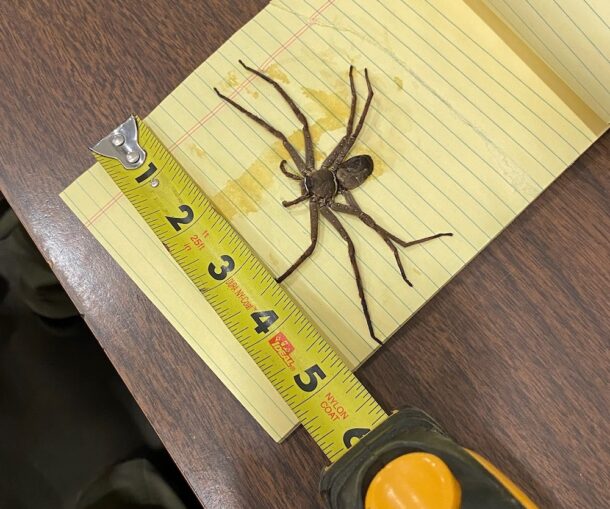Okay, let’s not get out of control here. The pic below (and on the homepage) was taken at my nephew’s work. He opened a crate, which was delivered from Taiwan, and out jumped this huntsman spider, alive! YIKES!

We thought it would be fun to ask some of our industry friends what would they rather encounter on the jobsite or in a tight crawlspace—spiders, rats or snakes?
Before we get to the responses, here’s a little background info …
… With more than 30,000 species of spiders in the U.S., only two are of any real concern: the black widow and the brown recluse. Although this info is a bit outdated—Feb 2001—according to U.S. Bureau of Labor Statistics, insects and arachnids inflicted 36,100 nonfatal occupational injuries and illnesses involving time away from work in the 1992-97 period. This was almost half of the total number of animal-related workplace injuries and illnesses.
It is estimated that less than three deaths per year occur from spider bites. However, most victims are children, this according to info provided by the Boston Children’s Hospital. Most of the 30,000 or so species of spiders found in the United States are poisonous, but their fangs are too short or too fragile to break through human skin. The bites of most spiders cause only minor, local reactions.
According to American Family Physician website. spiders inflict serious bites to humans because of their delicate mouthparts and impotent or prey-specific venoms. However, some spiders produce toxic venoms that can cause skin lesions, systemic illnesses, and neurotoxicity.
The Center for Disease Control’s (CDC) National Institute for Occupational Safety and Health says that venomous snakes found in the United States include rattlesnakes, copperheads, cottonmouths/water moccasins, and coral snakes. A venomous bite is called an “envenomation.” Although death from venomous snake bites is rare, a worker with a severe envenomation or allergy to snake venom can die from a venomous bite. Each year, an estimated 7,000–8,000 people are bitten by venomous snakes in the United States, and about 5 of those people die. The number of deaths would be much higher if people did not seek medical care.
Workers are far more likely to suffer long-term injuries from snake bites than to die from them. For those bitten by rattlesnakes, 10–44 percent will have lasting injuries. An example of a disability or permanent injury is the ability to use a finger or losing part or all of it.
And rats and mice? We all know by now that these varmints carry a number of diseases that can infect both people and pets. According the Environmental Protection Agency (EPA), rodent-borne diseases can be transferred directly to humans through:
- Bite wounds
- Consumption of food and/or water or breathing dust contaminated by rodent droppings and other waste products
- Indirectly by way of ticks, mites, and fleas that transmit the infection to humans after feeding on infected rodents.
Ok, now to the responses … Would you rather?
• Danielle “Twig” Browne, facilities management plumber for the Canadian government, stationed at the Memorial University of Newfoundland (@thelittelestplumber)—”I’d prefer bugs! We don’t have roaches here but if we did my answer might change. I can’t stand the smell of rat waste. And, we don’t have snakes on my island so that’s never been an issue for me. A deal breaker would absolutely be a snake though!”
• Mary-Anne Bowcott, owner, Westcom Plumbing and Gas Ltd, as well as Westcom Roofing and Sheetmetal, on Vancouver Island, British Columbia, Canada (@the_ladyplumber)—“Rats or mice. Because I’m used to them and they don’t bother me. They will run and hide if you’re down there as bugs and snakes won’t. Technically where I live, snakes would be the best option because here they are tiny, non-poisonous and don’t live in crawlspaces. But I’ve seen some of the videos on IG and those are def not the snakes we have here. Honestly, bugs and spiders don’t bother me, but there’s always a chance of a black widow, so I’ll choose rats over them.
• Adam Rotherham, owner, Down Under Drainage, Los Angeles (@downunderdrainage)—”In Sydney, Australia, where I’m from, I would probably rather deal with spiders. Generally, I would throw a couple of spider bombs (foggers) under the house a couple of days before I was going under. We have a lot of redback and funnel web spiders in Sydney. Funnel webs are deadly, redbacks not so much; they just give a nasty bite. Sometimes we would get brown snakes around the house, but I’ve never seen one in the crawlspace. I can’t stand the smell of rat and mice urine. In Los Angeles, I’m not really concerned about anything because there aren’t really any snakes, and the spiders are only black widows from what I’ve seen.”
• Linda Hudek, owner, LH Plumbing Services, Fairfield, Ohio (@thebrunetteplumber)—”I’ll take the snakes. I don’t mind the mice and rats, except for the diseases they carry lol. The snakes eat all of the bad stuff, so I’m good with them. I cannot stand it when I have spideys in my hair.”
• Tim Kuhlman, plumbing and hydronic technician, Grasser’s Plumbing & Heating, McNabb, Ill. (@tlkuhlman)—“In reality, I’m big on scene safety. Spiders, mice and snakes bite, and that could affect my health. I go in and sweep out spiders and cobwebs, maybe spray. Mice and snakes you can usually run off, and then I would tarp my work area and light it up.”
• Brent Ridley, owner, Miracle Mechanical, Cumming, Ga. (@miraclemechanical)—”I’ll take spiders/bugs. I don’t do snakes. “I carry a long piece of PEX with me to bat down the spider webs in the crawlspace.”
• Mike Prencavage, owner, The Family Plumber, Los Alamitos, Calif. (@socalplumbguy)—“Rats or mice because they avoid people. Roaches spiders and bugs will crawl all up on you. Honestly, possums are a deal breaker. They are viscous animals, and they will hiss and attack!”



